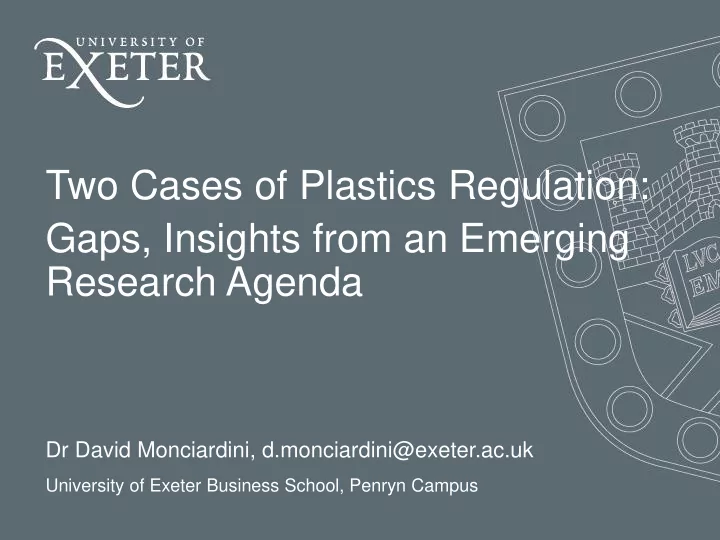

Two Cases of Plastics Regulation: Gaps, Insights from an Emerging Research Agenda Dr David Monciardini, d.monciardini@exeter.ac.uk University of Exeter Business School, Penryn Campus
Norway Waste Policy. It’s a long story…
Deposit Return Scheme (Norway) Operated exclusively by Infinitum (Norwegian Environmental Agency 1999), owned in equal share by beverage producers and the Norwegian grocery industry. Voluntary scheme . Producers and importers of beverages pay a deposit to Infinitum to label their bottles and cans with the deposit symbol. High tax on manufacturing of beverage bottles. But a rebate depending on return and recycling rate (above 95% is zero). Consumers pay deposit upon purchase, they get it back when their return empty bottles and cans to a retailer (e.g. store).
Deposit Return Scheme (Norway) Several retailers use reverse vending machines that read the bar code on the cans and bottles, and issue a deposit note to the customer. Infinitum sends the collected bottles and cans to production facilities , which recycles cans by melting aluminium into new aluminium sheets, and cleans plastic bottles to make preforms that producers can purchase. As a result of this system, nearly all plastic bottles and cans are returned, reused and/or recycled. "it's not unusual in Norway for a plastic bottle to be on its 50th reincarnation as a plastic bottle. Less than 1 percent of discarded plastic bottles in Norway wind up in the natural environment.." Kjell Olav Maldum (CEO Infinitum, Guardian 2018)
Deposit Return Scheme: Challenges/Hopes
Ban on BPA in food contact materials Dec. 2012 : France adopted a law banning the use of bisphenol A (BPA) in food contact materials (FCMs). Jan. 2013 : the ban became effective for FCMs intended for children below 3 yo. Jan. 2015 : the ban of BPA in all FCMs entered into force. Sept. 2015 : PlasticsEurope complaint. The French Constitutional Court decided exempting the manufacture and export but confirmed the ban of BPA-containing FCMs on the French market. Several other countries also have legislation designed to either restrict or prohibit the use of BPA in FCMs, especially those designed and intended for use by young children.
What’s the problem? Bisphenol A (BPA) is an hormone disrupting chemical commonly used in the production of polycarbonate, used to make food containers, particularly beverage bottles (including infant feeding bottles). BPA has been identified as particularly damaging to foetuses, babies and young children brain development, with studies showing that BPA can be released into food and beverages (e.g. when boiling water is added to baby bottle to make formula milk). However, research shows BPA is safe at the very low levels that occur in some foods. Remedy? Use BPA-free products; alternative containers; or avoid heat.
France vs. EU: Ban on BPA in FCMs In 2018 the European Commission considered an infringement case against France’s ban of bisphenol A in FCMs. However there was no agreement within the EC to proceed ( Chemical Watch , 2018). An internal EC briefing document called the French ban on BPA “ fully disproportionate ,” creating “ considerable legal uncertainty, both within the internal market and as regards the EU commercial relations with third countries . ” How to deal with hazardous chemicals, particularly in FCMs? How to manage the public perception of risks? What is the role of law-makers?
What’s next? • Collaboration with the Universities of Lund (Sweden) and of Surrey. Publication of the report by October 2019. • “Regulating the Circular Economy: Gaps, Insights and an Emerging Research Agenda” Journal of Cleaner Production. Final submission deadline: 30 November 2019
Exeter Multidisciplinary Plastics Research hub: ExeMPLaR Increased value can be achieved by maintaining the integrity of a product or material at a higher level, using products longer, cascading their use in adjacent value chains and designing pure, avoiding contamination and toxicity .
Thank You! Dr David Monciardini, d.monciardini@exeter.ac.uk
Recommend
More recommend